.
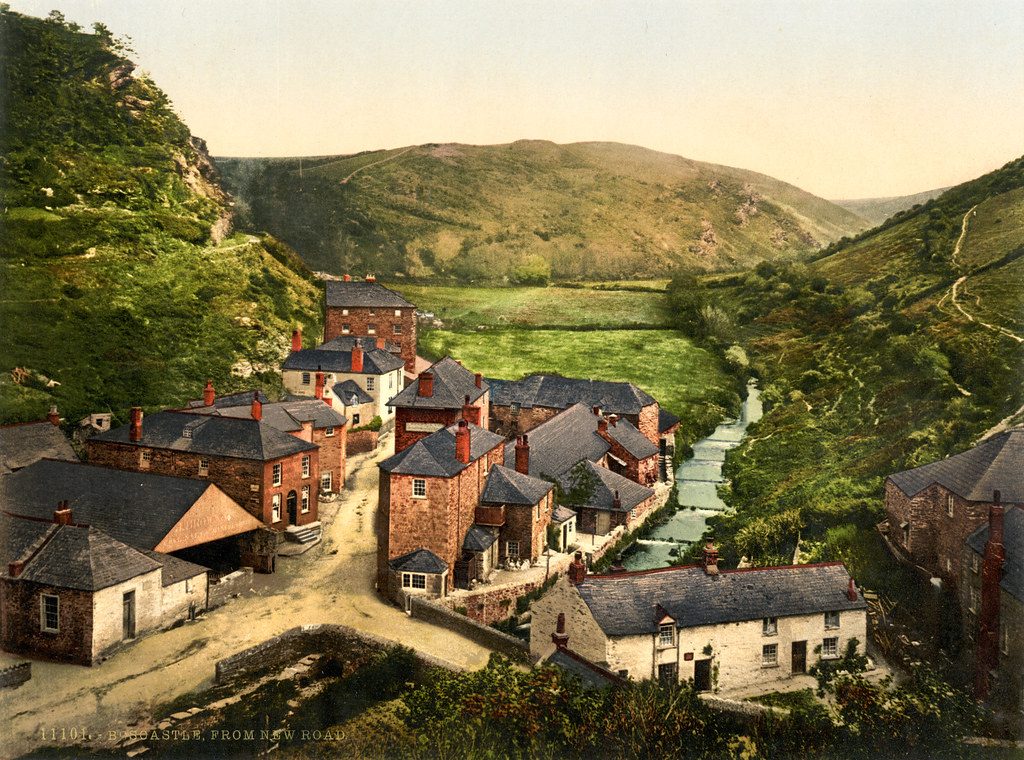
New Road, Boscastle, Cornnwall, ca. 1895: photochrome print by Photoglob Zürich, between 1890 and 1910; image by trialsanderrors (Library of Congress)
As I drive to the junction of lane and highway,
And the drizzle bedrenches the waggonette,
I look behind at the fading byway,
And see on its slope, now glistening wet,
Distinctly yet
Myself and a girlish form benighted
In dry March weather. We climb the road
Beside a chaise. We had just alighted
To ease the sturdy pony’s load
When he sighed and slowed.
What we did as we climbed, and what we talked of
Matters not much, nor to what it led, ―
Something that life will not be balked of
Without rude reason till hope is dead,
And feeling fled.
It filled but a minute. But was there ever
A time of such quality, since or before,
In that hill’s story ? To one mind never,
Though it has been climbed, foot-swift, foot-sore,
By thousands more.
Primaeval rocks form the road’s steep border,
And much have they faced there, first and last,
Of the transitory in Earth’s long order;
But what they record in colour and cast
Is—that we two passed.
And to me, though Time’s unflinching rigour,
In mindless rote, has ruled from sight
The substance now, one phantom figure
Remains on the slope, as when that night
Saw us alight.
I look and see it there, shrinking, shrinking,
I look back at it amid the rain
For the very last time; for my sand is sinking,
And I shall traverse old love’s domain
Never again.
Thomas Hardy: At Castle Boterel, March 1913, from Poems of 1912-13, in Satires of Circumstance, Lyrics and Reveries (1914)
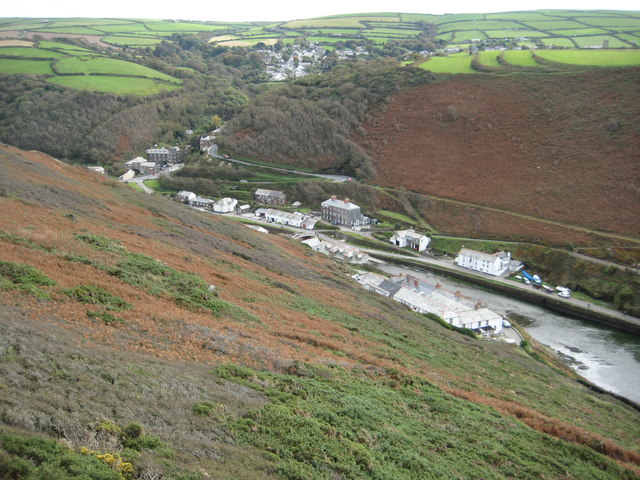
Boscastle from Penally Hill. The centre of Bascastle viewed from the coast path on Penally Hill photo by Phillip Halling, 29 September 2009

Boscastle: the village from Penally Point. A view up the Valency valley from the west: photo by Chris Downer, 25 August 2009
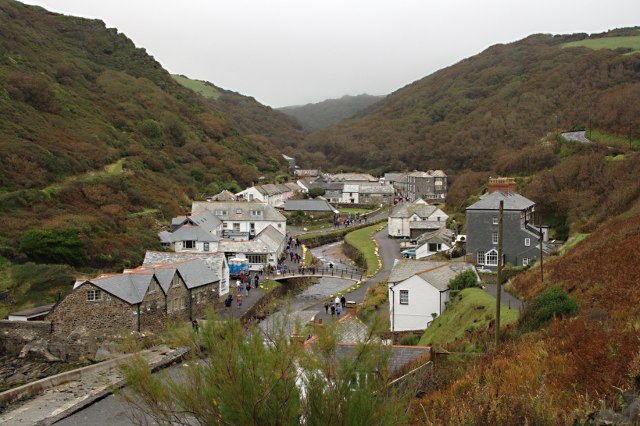
Boscastle. Looking down on Boscastle from the coast path above the harbour: photo by Tony Atkin, 7 September 2009

Boscastle. From Penally Point: photo by Rob Taylor, 24 July 2003
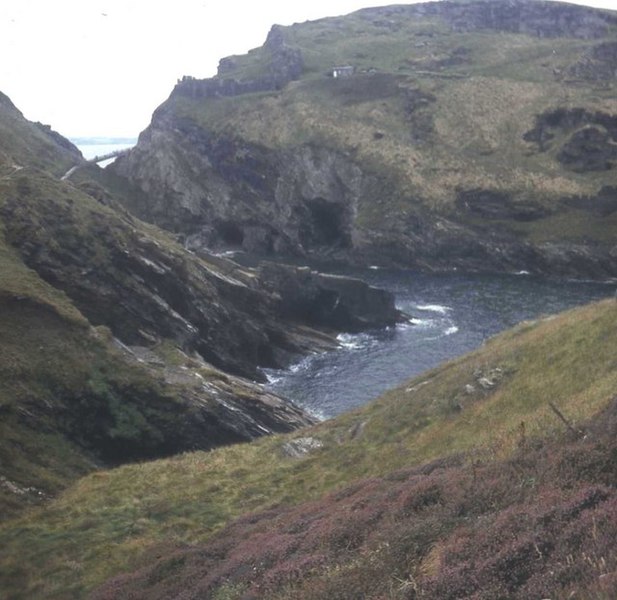
Merlin's Cave viewed from Barras Nose. With the bridge across to Tintagel Castle to the left: photo by Trevor Rickard, September 1986
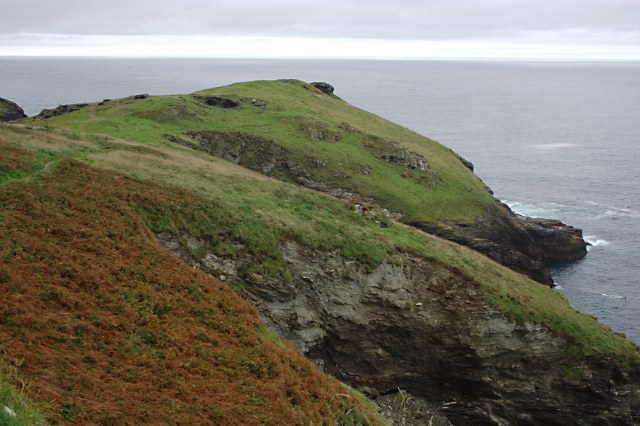
Barras Nose. Barras Nose is one of the many promontories on this coastline: photo by Tony Atkin, 7 September 2009

Quartz on the cliff, Boscastle. The quartz is found as veins in the slate, and occasionally in what appear to be large chunks, but in some cases at least there is only a veneer of quartz over the slate. In effect, these are exposed veins: photo by Humphrey Bolton, 7 May 2009
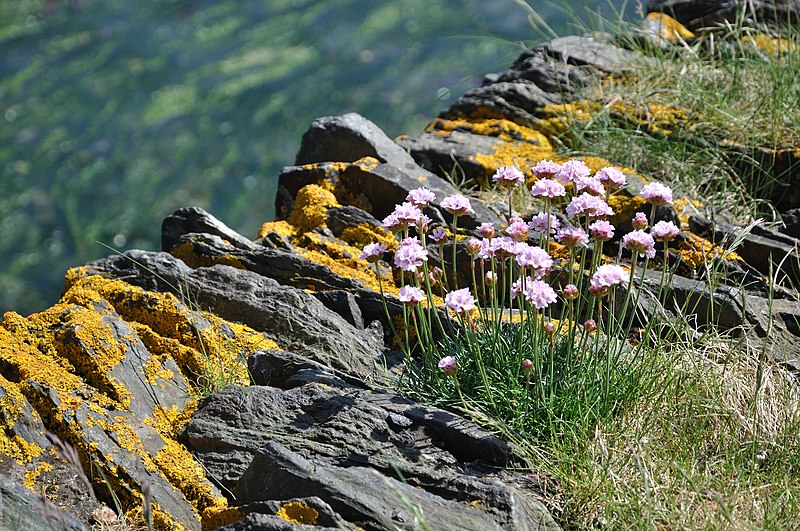

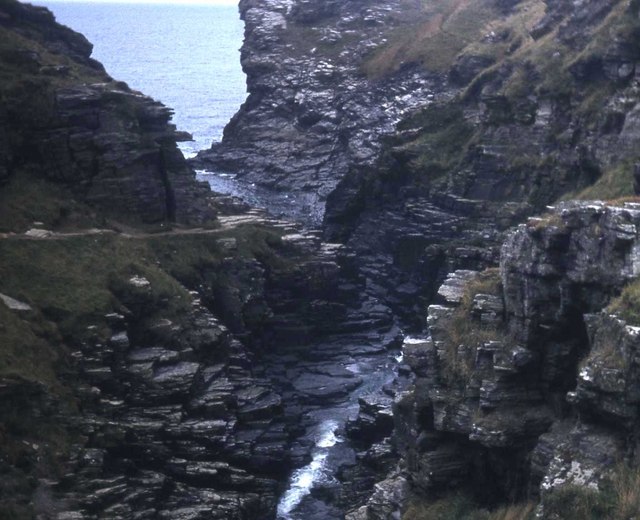

A note on poetry by TH:
ReplyDelete"What made poetry 2000 years ago makes poetry now."
Ezra Pound on TH's poetry (1938):
"No man can read Hardy's poems collected but that his own life, and forgotten moments of it, will come back to him, a flash here and an hour there. Have you a better test of true poetry?...
"There is a flood of life caught in this crystal."
Virginia Woolf and her husband Leonard visited TH at Max Gate near the end of his life, in July 1926. She wrote up six pages in her diary on the visit.
Hardy -- "a little puffy cheeked cheerful old man" -- served her "a good tea". He confessed he did not care much for modern fiction.
"'They've changed everything now,' he said. 'We used to think there was a beginning and a middle and an end. We believed in the Aristotelian theory. Now one of those stories came to an end with a woman going out of the room'."
When she left, her host presented her (at Mrs H's prompting) with a copy of her favourite among his novels, The Mayor of Casterbridge. In the dedication he mispelt her name as "Wolff".
Another one of Hardy's many timelessly poignant poems.
ReplyDeleteIs - that we two passed
ReplyDelete...
a single line makes it.
Tom,
ReplyDeleteA pleasure to read this (heretofore unknown) poem, such "a flood of life caught in this crystal" as Pound says, such control of the line, sound, emotion (only barely held in check, Hardy the master in fine form.
And these photos too!
10.7
whiteness of fog moving across shadowed
ridge, sunlit red of apples on branches
in foreground, wave sounding in channel
no matter how singular both
objects, as “so exact”
planes of light under table,
situation, of subject
silver line of sun reflected in channel,
line of cloud in pale blue sky above it
Every moment passes
ReplyDeletebut this one.
This one lives, stays,
adheres to consciousness,
takes root in the heart,
graces a lifetime . . .
its quality unlike
others in the stream.
To wake up in Time
is to be alive,
inhabit the moment,
to lay claim to it —
a note sounded just once,
possessing infinite sustain.
Hart Crane, in a letter to Yvor Winters dated May 29, 1927, writes this of Hardy:
ReplyDelete"I think him perhaps the greatest technician in English verse since Shakespeare."
Creeley's "Versions / After Hardy" originally in "Mirrors" now page 204 in the Collected 1975-2005
ReplyDeleteis such a wonderful homage:
Why would she come to him,
come to him,
in such disguise
to look again at him—
look again—
with vacant eyes—
and why the pain still,
the pain—
still useless to them—
as if to begin again—
again begin—
what had never been?
.
Why be
persistently
hurtful—
no truth
to tell
or wish to?
Why?
.
The weather's still grey
and the clouds gather
where they once walked
out together,
watched the world with
a faint happiness,
watched it die
in the same place.
...
These 3 "versions" feel true to Hardy, and yet somehow seem very Creeleyesque at the same time—true to his own poetic genius . . .
Old love's domain
ReplyDeleteis where I live
in my little cave
planning my jumps
into the summer waters
into the turquoise.
The slate stone so smooth
platelets
dark with quartz
as a rough surprise
Pink in the sun. I swim there
instead of the little cove
differently. Solid.
I heard
Ezra Pound's castle
was somewhere around here.
All this of late, Hardy’s poems and your fine delving here and yesterday, remind me of Borges’s “Límites”—the two poems by that name—but especially the longer one from Nuevo Antología Personal. Of which, the final verse:
ReplyDeleteCreo en el alba oír un atareado
rumor de multitudes que se alejan;
son lo que me ha querido y olvidado;
espacio y tiempo y Borges ya me dejan.
At dawn I seem to hear the busy
murmur of a crowd moving away;
they are what I have loved and forgotten;
space and time and Borges now leave me.
Susan,
ReplyDeleteA leap into the turquoise -- just what the old geezers here need about now.
To wake up in Time
is to be alive,
inhabit the moment,
to lay claim to it —
a note sounded just once,
possessing infinite sustain.
Hazen's lines a complement to Hardy's poem, accentuating the positive a bit more than TH might have (well, good for Hazen).
Vassilis has earlier mentioned John Crowe Ransom's 1961 edition of Hardy (which went into paperback with Collier), in effect the introduction to/sanction upon Hardy's poetry for an American academic audience.
Ransom's attitude toward Hardy is ambivalent always, respectful of the skills, patronising toward the "primitivism". Still he paid attention, and in this piece he talks about Hardy's use of the "folk line".
"Hardy: Old Poet"--John Crowe Ransom, The New Republic, 1952
Bill is spot on in relating Hardy and Creeley. The affinity was felt more intensely by Creeley as he grew older. This happens with Hardy. The poem Bill quotes, "Versions", comes from a set of a half dozen writ in 1981 under direct influence of TH. It was Hardy's example that released Creeley into the material he develops in what I think is the strongest poem in that set, "Mother's Voice". At the time a neighbor who'd acquired a mimeo machine as a sort of curious vintage toy asked me to produce some books on it. I asked Bob for work, and he sent the poems in that little set. Here is the title piece.
Robert Creeley: Mother's Voice